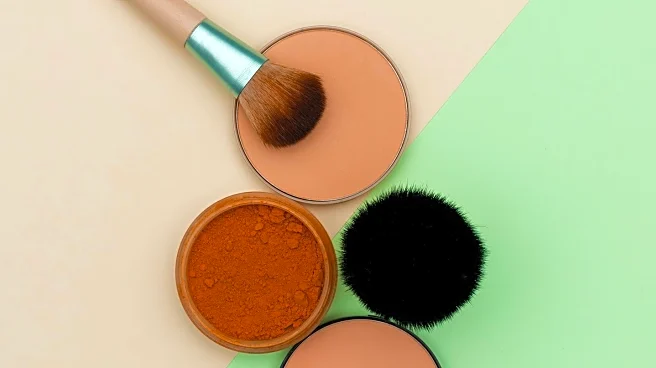What's Happening?
Zero waste makeup brands are gaining traction as consumers seek sustainable alternatives to traditional beauty products. Brands like Elate and Kjaer Weis are offering refillable and compostable packaging
for a wide range of cosmetics, including eye makeup, face makeup, and lip products. These brands prioritize eco-friendly packaging and clean formulations, using organic ingredients free of harmful chemicals. The beauty industry is notorious for its plastic use, contributing significantly to global pollution. By opting for refillable or compostable packaging, consumers can help conserve resources and reduce waste, aligning their beauty routines with environmental values.
Why It's Important?
The rise of zero waste makeup brands represents a significant shift in the beauty industry towards sustainability. By reducing reliance on single-use plastics, these brands are helping to mitigate the environmental impact of beauty products. This shift not only benefits the planet but also aligns with consumer demand for ethical and eco-friendly products. As more brands adopt sustainable practices, the beauty industry can play a pivotal role in promoting environmental responsibility and encouraging mindful consumption. The trend also highlights the potential for innovation in product design and packaging, offering new opportunities for brands to differentiate themselves in a competitive market.
What's Next?
As zero waste makeup brands continue to gain popularity, more companies are expected to adopt similar practices, expanding their sustainable offerings. This could lead to increased innovation in packaging design and materials, further reducing environmental impact. Consumer education on the benefits of zero waste products will be key to driving adoption. Brands may also explore partnerships with retailers to facilitate refill programs, making it easier for consumers to participate in sustainable practices. The success of zero waste makeup could inspire other industries to adopt similar strategies, broadening the impact of sustainability efforts across sectors.
Beyond the Headlines
The shift towards zero waste makeup highlights the importance of sustainability in consumer decision-making. As consumers become more environmentally conscious, they are likely to prioritize brands that offer eco-friendly solutions. This trend could lead to a broader cultural shift towards responsible consumption and waste reduction. Additionally, the focus on zero waste products underscores the need for transparency in product sourcing and manufacturing, encouraging brands to adopt ethical practices throughout their supply chains. As the beauty industry continues to evolve, sustainability will remain a key driver of innovation and growth.








